外研版九下Module 1 Unit 2课件(35张PPT)
文档属性
| 名称 | 外研版九下Module 1 Unit 2课件(35张PPT) | 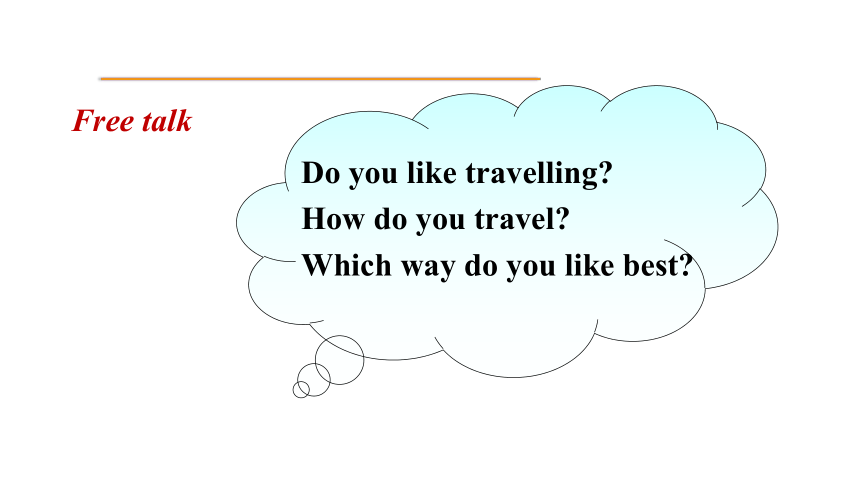 | |
| 格式 | pptx | ||
| 文件大小 | 1.9MB | ||
| 资源类型 | 试卷 | ||
| 版本资源 | 外研版 | ||
| 科目 | 英语 | ||
| 更新时间 | 2024-01-30 11:05:52 | ||
图片预览

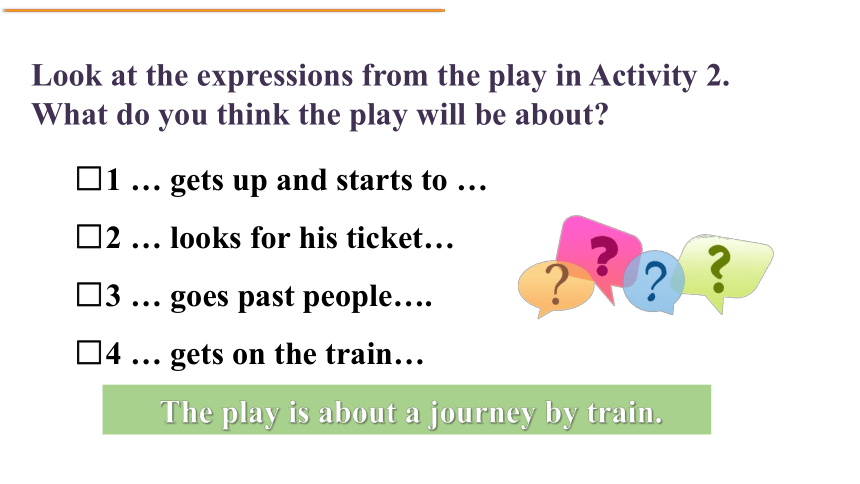
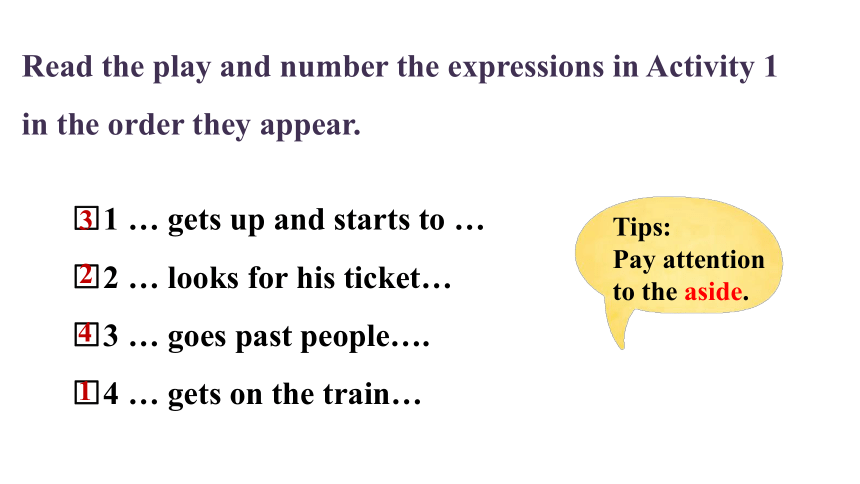
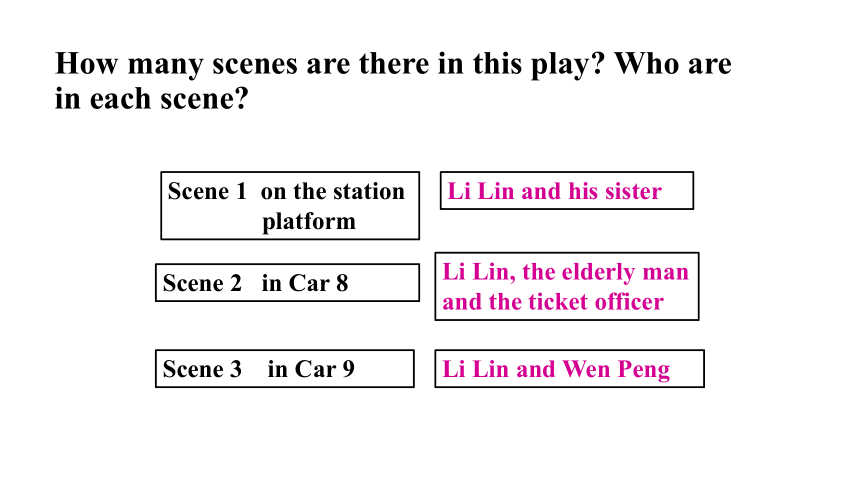
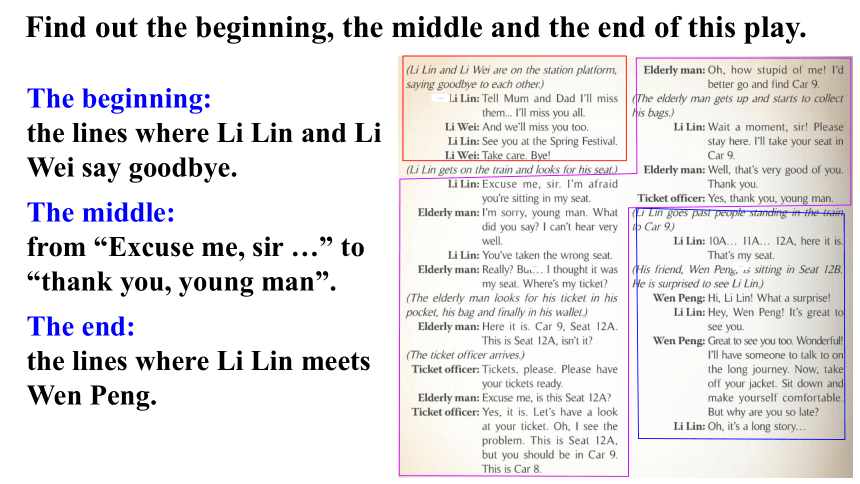
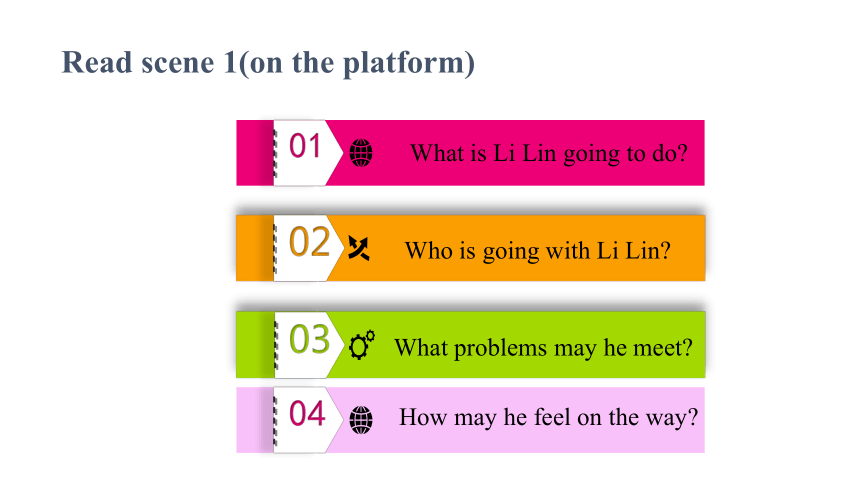
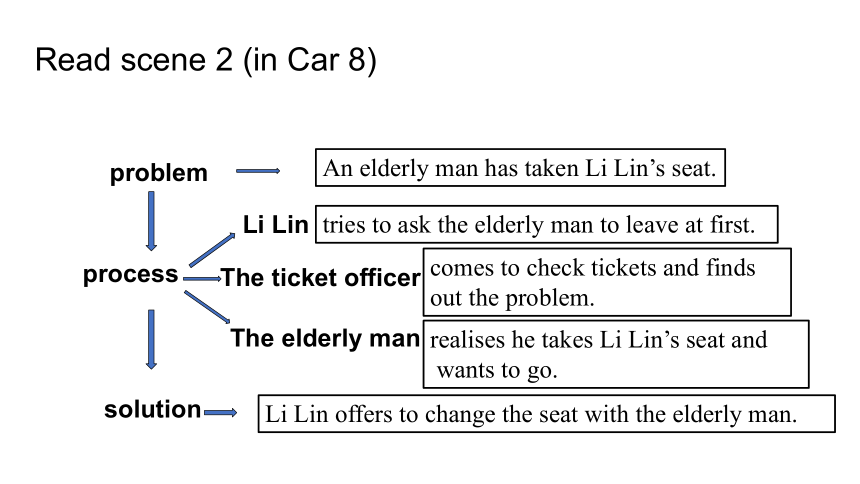
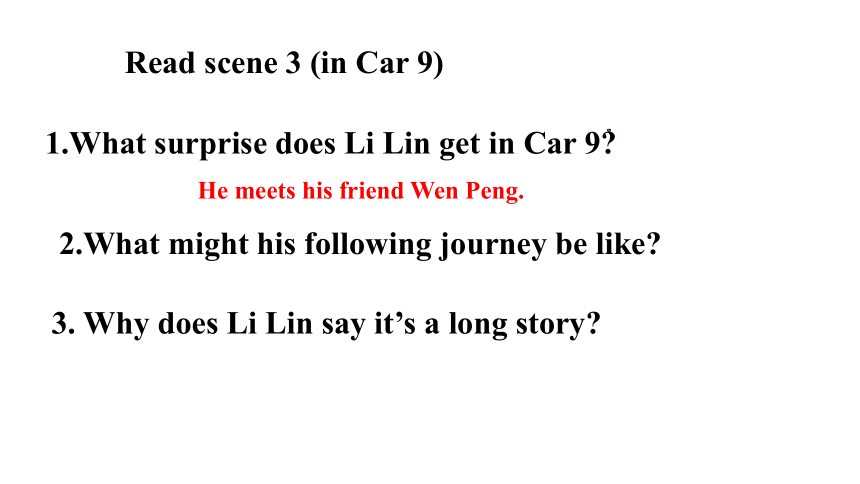
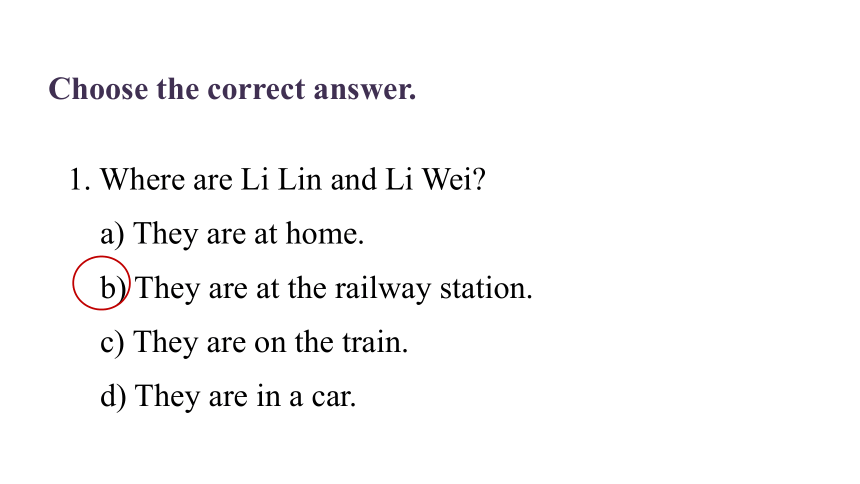
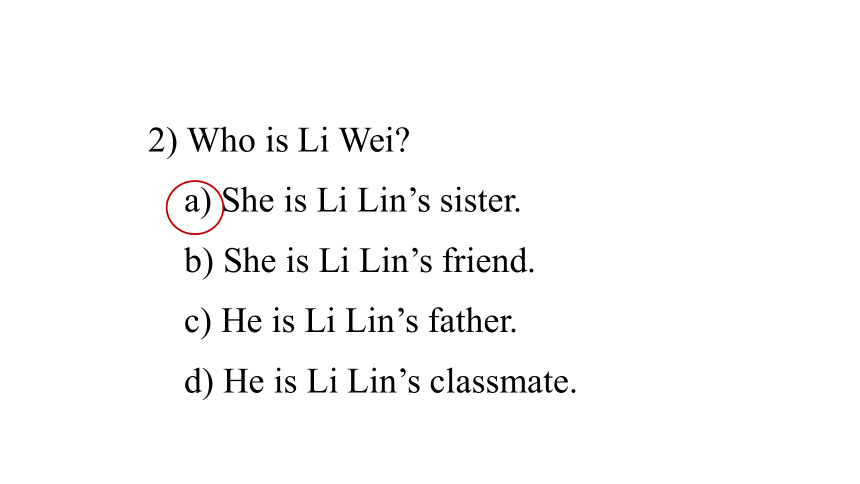
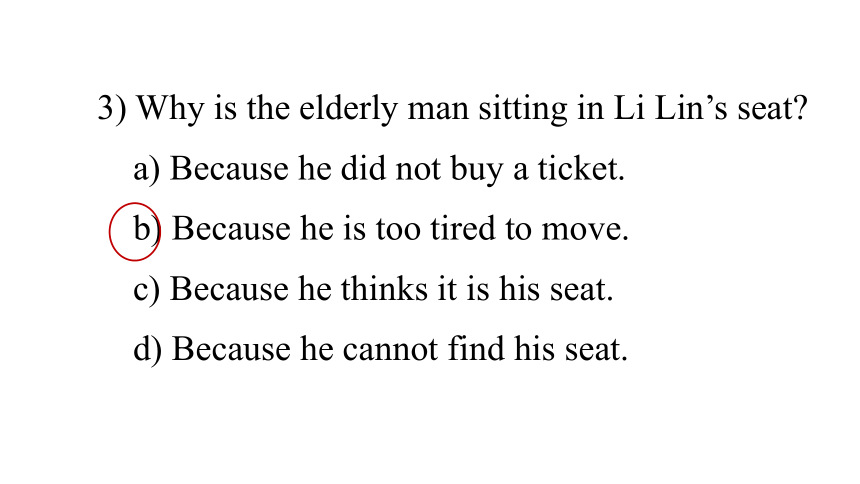
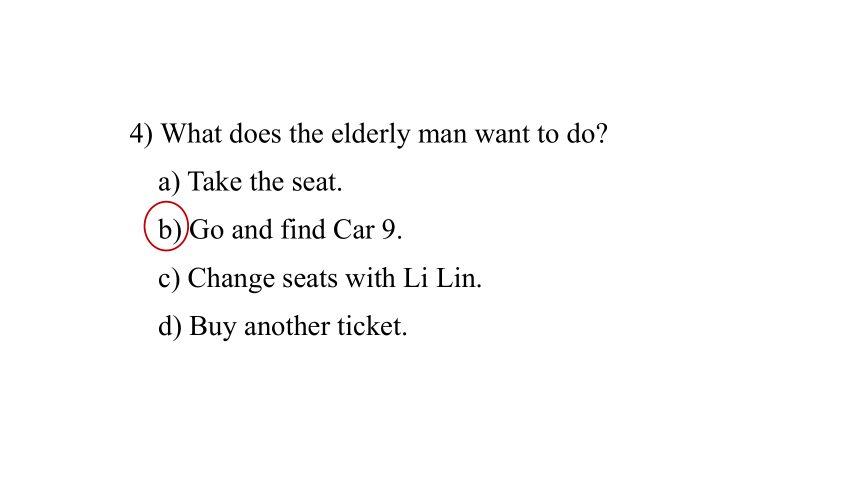
文档简介
(共35张PPT)
Do you like travelling
How do you travel
Which way do you like best
Free talk
Look at the expressions from the play in Activity 2. What do you think the play will be about
□1 … gets up and starts to …
□2 … looks for his ticket…
□3 … goes past people….
□4 … gets on the train…
The play is about a journey by train.
Read the play and number the expressions in Activity 1 in the order they appear.
□1 … gets up and starts to …
□2 … looks for his ticket…
□3 … goes past people….
□4 … gets on the train…
3
2
4
1
Tips:
Pay attention to the aside.
How many scenes are there in this play Who are in each scene
Scene 1 on the station
platform
Scene 2 in Car 8
Scene 3 in Car 9
Li Lin and his sister
Li Lin, the elderly man and the ticket officer
Li Lin and Wen Peng
Find out the beginning, the middle and the end of this play.
The beginning:
the lines where Li Lin and Li Wei say goodbye.
The middle:
from “Excuse me, sir …” to “thank you, young man”.
The end:
the lines where Li Lin meets Wen Peng.
The beginning
The middle
The end
01
02
03
What is Li Lin going to do
Who is going with Li Lin
What problems may he meet
04
04
How may he feel on the way
Read scene 1(on the platform)
Read scene 2 (in Car 8)
problem
Li Lin
solution
An elderly man has taken Li Lin’s seat.
process
The elderly man
The ticket officer
Li Lin offers to change the seat with the elderly man.
tries to ask the elderly man to leave at first.
comes to check tickets and finds out the problem.
realises he takes Li Lin’s seat and
wants to go.
Read scene 3 (in Car 9)
1.What surprise does Li Lin get in Car 9
2.What might his following journey be like
He meets his friend Wen Peng.
3. Why does Li Lin say it’s a long story
Choose the correct answer.
1. Where are Li Lin and Li Wei
a) They are at home.
b) They are at the railway station.
c) They are on the train.
d) They are in a car.
2) Who is Li Wei
a) She is Li Lin’s sister.
b) She is Li Lin’s friend.
c) He is Li Lin’s father.
d) He is Li Lin’s classmate.
3) Why is the elderly man sitting in Li Lin’s seat
a) Because he did not buy a ticket.
b) Because he is too tired to move.
c) Because he thinks it is his seat.
d) Because he cannot find his seat.
4) What does the elderly man want to do
a) Take the seat.
b) Go and find Car 9.
c) Change seats with Li Lin.
d) Buy another ticket.
5) What does Li Lin decide to do
a) Take the seat from the elderly man.
b) Ask the ticket officer for help.
c) Change seats with the elderly man.
d) Get off the train.
6) Who does Li Lin meet in Car 9
a) Li Wei.
b) Another elderly man.
c) His friend.
d) His classmate.
Complete the passage with the words and expressions in the box.
Li Lin says goodbye to his sister Li Wei. Li Lin says that he will (1) _____ his family, and Li Wei tells him to (2) __________. When Li Lin gets on the train, he sees an elderly man sitting in his seat. He politely calls the elderly man (3)____and says he is (4) ______ the elderly man is sitting in his seat. The ticket (5) _______ arrives and explains the mistake. Li Lin kindly offers to change seats with the elderly man, and goes to Car 9. There he sees his friend Wen Peng, who is happy to see him and tells him to (6)________ his jacket, sit down and make himself comfortable.
miss
take care
sir
afraid
officer
take off
afraid miss officer sir take care take off
Discuss
What do you think of Li Lin and his behavior
What can we learn from him
kind/ kind-hearted
helpful
polite/ good-mannered
有礼貌的
cultured
有教养的
Little kindness goes a long way.
待人以善, 行将更远。
The elderly man looks for his ticket in his pocket, his bag and finally in his wallet.
那位老人在口袋里、包里、钱包里找他的车票。
elderly, 形容词, 是委婉用语, 意为“上了年纪的”, 外国人一般不说old man; 而用elderly man代替, the elderly 泛指老人。
Language points
elder指“年长的(尤指家庭成员之间)”, 只能修饰人; 在句中作定语, 不能作表语; elder不能和than连用。
older既可修饰人, 也可修饰物; 在句中既可作定语, 也可作表语; older可以和than连用。
根据句意, 用older或elder填空:
Lucy's ________ brother is two years ______ than her.
older
elder
2. Please have your tickets ready.
请大家准备好车票。
have sth. ready 表示“把某物准备好”。
We had a room ready for you.
我们给您准备了一个房间。
I’ll have some breakfast ready in a few minutes.几分钟后我就能做好早饭。
3. Now take off your jacket.
现在把夹克脱了吧。
take off表示“脱下”,其反义短语是put on “穿上”。
Please take off your shoes before going into the house.
请你在进屋之前脱掉你的鞋。
It’s warm here. You may take off your coat.
这里很暖和, 你可以把外衣脱下来。
take off 还可以表示“起飞”,其反义词是land “降落”。
The plane took off half an hour ago.
飞机在半小时前起飞了。
用合适的词/短语填空:
The plane will _________ from Beijing Capital Airport and land in London.
take off
4.Take care. Bye!多保重。再见!
[探究] take care为告别用语,意为“_________”,用于向家人或朋友告别。如:
See you next week. ____________!
下周见。多保重!
多保重
Take care
(1)take care还可译为“当心;小心”,可以单独使用,也可以后跟动词不定式或that从句,相当于be careful。如:
Take care not to go across the road alone.
注意不要自己过马路。
(2)take care of意为“照顾;照料”,相当于________。如:
Please help me take care of my little sister.
=Please help me _________ my little sister.
请帮我照顾我的妹妹。
look after
look after
(1)当心!公交车来了。
________ ________! The bus is coming.
(2)改为同义句
My sister will take care of my cat when I am on holiday.
My sister will ________ ________ my cat when I am on holiday.
Take care
look after
Work in groups.
Choose one scene and act it out with your group members.
Role-play
Pronunciation
Emotion
Fluency
Scene 1
Scene 2
Scene 3
Write a short passage about a trip you have made. Think about:
● when and where you went
● how you travelled
● who you travelled with
● what happened during the trip
● how the story ended
Writing
when and where you went
Last summer I went to Hong Kong for a holiday.
how you travelled
I travelled by plane.
who travelled with you
I traveled with my family.
what happened during the trip
I felt dizzy and uncomfortable.
how the story ended
The airhostess came to me and gave me a a cup of water and a towel, and asked me to have a good rest.
I went to Beijing on vacation with my parents this summer.
The weather was sunny and hot. First we went to Tian’anmen Square and watched the flag-raising ceremony. It was so exciting! Then we went to the Great Wall by bus. It looked really wonderful and it was full of people there.
The next day, we visited the Palace Museum, the Summer Palace and the Temple of Heaven. We took quite a few photos and we learnt something important about Chinese history.
What a good time we had in Beijing! The trip was so interesting that we looked forward to visiting Beijing again.
Key words and phrases:
take care, officer, stupid, take off, jacket
Key sentences:
Li Lin and Li Wei are on the station platform, saying goodbye to each other.
I thought it was my seat.
Please have your tickets ready.
How stupid of me!
Summary
Read and retell the passage.
2.Write a play about the traveling experience of your parents .
3.Do the exercises.
Homework
Do you like travelling
How do you travel
Which way do you like best
Free talk
Look at the expressions from the play in Activity 2. What do you think the play will be about
□1 … gets up and starts to …
□2 … looks for his ticket…
□3 … goes past people….
□4 … gets on the train…
The play is about a journey by train.
Read the play and number the expressions in Activity 1 in the order they appear.
□1 … gets up and starts to …
□2 … looks for his ticket…
□3 … goes past people….
□4 … gets on the train…
3
2
4
1
Tips:
Pay attention to the aside.
How many scenes are there in this play Who are in each scene
Scene 1 on the station
platform
Scene 2 in Car 8
Scene 3 in Car 9
Li Lin and his sister
Li Lin, the elderly man and the ticket officer
Li Lin and Wen Peng
Find out the beginning, the middle and the end of this play.
The beginning:
the lines where Li Lin and Li Wei say goodbye.
The middle:
from “Excuse me, sir …” to “thank you, young man”.
The end:
the lines where Li Lin meets Wen Peng.
The beginning
The middle
The end
01
02
03
What is Li Lin going to do
Who is going with Li Lin
What problems may he meet
04
04
How may he feel on the way
Read scene 1(on the platform)
Read scene 2 (in Car 8)
problem
Li Lin
solution
An elderly man has taken Li Lin’s seat.
process
The elderly man
The ticket officer
Li Lin offers to change the seat with the elderly man.
tries to ask the elderly man to leave at first.
comes to check tickets and finds out the problem.
realises he takes Li Lin’s seat and
wants to go.
Read scene 3 (in Car 9)
1.What surprise does Li Lin get in Car 9
2.What might his following journey be like
He meets his friend Wen Peng.
3. Why does Li Lin say it’s a long story
Choose the correct answer.
1. Where are Li Lin and Li Wei
a) They are at home.
b) They are at the railway station.
c) They are on the train.
d) They are in a car.
2) Who is Li Wei
a) She is Li Lin’s sister.
b) She is Li Lin’s friend.
c) He is Li Lin’s father.
d) He is Li Lin’s classmate.
3) Why is the elderly man sitting in Li Lin’s seat
a) Because he did not buy a ticket.
b) Because he is too tired to move.
c) Because he thinks it is his seat.
d) Because he cannot find his seat.
4) What does the elderly man want to do
a) Take the seat.
b) Go and find Car 9.
c) Change seats with Li Lin.
d) Buy another ticket.
5) What does Li Lin decide to do
a) Take the seat from the elderly man.
b) Ask the ticket officer for help.
c) Change seats with the elderly man.
d) Get off the train.
6) Who does Li Lin meet in Car 9
a) Li Wei.
b) Another elderly man.
c) His friend.
d) His classmate.
Complete the passage with the words and expressions in the box.
Li Lin says goodbye to his sister Li Wei. Li Lin says that he will (1) _____ his family, and Li Wei tells him to (2) __________. When Li Lin gets on the train, he sees an elderly man sitting in his seat. He politely calls the elderly man (3)____and says he is (4) ______ the elderly man is sitting in his seat. The ticket (5) _______ arrives and explains the mistake. Li Lin kindly offers to change seats with the elderly man, and goes to Car 9. There he sees his friend Wen Peng, who is happy to see him and tells him to (6)________ his jacket, sit down and make himself comfortable.
miss
take care
sir
afraid
officer
take off
afraid miss officer sir take care take off
Discuss
What do you think of Li Lin and his behavior
What can we learn from him
kind/ kind-hearted
helpful
polite/ good-mannered
有礼貌的
cultured
有教养的
Little kindness goes a long way.
待人以善, 行将更远。
The elderly man looks for his ticket in his pocket, his bag and finally in his wallet.
那位老人在口袋里、包里、钱包里找他的车票。
elderly, 形容词, 是委婉用语, 意为“上了年纪的”, 外国人一般不说old man; 而用elderly man代替, the elderly 泛指老人。
Language points
elder指“年长的(尤指家庭成员之间)”, 只能修饰人; 在句中作定语, 不能作表语; elder不能和than连用。
older既可修饰人, 也可修饰物; 在句中既可作定语, 也可作表语; older可以和than连用。
根据句意, 用older或elder填空:
Lucy's ________ brother is two years ______ than her.
older
elder
2. Please have your tickets ready.
请大家准备好车票。
have sth. ready 表示“把某物准备好”。
We had a room ready for you.
我们给您准备了一个房间。
I’ll have some breakfast ready in a few minutes.几分钟后我就能做好早饭。
3. Now take off your jacket.
现在把夹克脱了吧。
take off表示“脱下”,其反义短语是put on “穿上”。
Please take off your shoes before going into the house.
请你在进屋之前脱掉你的鞋。
It’s warm here. You may take off your coat.
这里很暖和, 你可以把外衣脱下来。
take off 还可以表示“起飞”,其反义词是land “降落”。
The plane took off half an hour ago.
飞机在半小时前起飞了。
用合适的词/短语填空:
The plane will _________ from Beijing Capital Airport and land in London.
take off
4.Take care. Bye!多保重。再见!
[探究] take care为告别用语,意为“_________”,用于向家人或朋友告别。如:
See you next week. ____________!
下周见。多保重!
多保重
Take care
(1)take care还可译为“当心;小心”,可以单独使用,也可以后跟动词不定式或that从句,相当于be careful。如:
Take care not to go across the road alone.
注意不要自己过马路。
(2)take care of意为“照顾;照料”,相当于________。如:
Please help me take care of my little sister.
=Please help me _________ my little sister.
请帮我照顾我的妹妹。
look after
look after
(1)当心!公交车来了。
________ ________! The bus is coming.
(2)改为同义句
My sister will take care of my cat when I am on holiday.
My sister will ________ ________ my cat when I am on holiday.
Take care
look after
Work in groups.
Choose one scene and act it out with your group members.
Role-play
Pronunciation
Emotion
Fluency
Scene 1
Scene 2
Scene 3
Write a short passage about a trip you have made. Think about:
● when and where you went
● how you travelled
● who you travelled with
● what happened during the trip
● how the story ended
Writing
when and where you went
Last summer I went to Hong Kong for a holiday.
how you travelled
I travelled by plane.
who travelled with you
I traveled with my family.
what happened during the trip
I felt dizzy and uncomfortable.
how the story ended
The airhostess came to me and gave me a a cup of water and a towel, and asked me to have a good rest.
I went to Beijing on vacation with my parents this summer.
The weather was sunny and hot. First we went to Tian’anmen Square and watched the flag-raising ceremony. It was so exciting! Then we went to the Great Wall by bus. It looked really wonderful and it was full of people there.
The next day, we visited the Palace Museum, the Summer Palace and the Temple of Heaven. We took quite a few photos and we learnt something important about Chinese history.
What a good time we had in Beijing! The trip was so interesting that we looked forward to visiting Beijing again.
Key words and phrases:
take care, officer, stupid, take off, jacket
Key sentences:
Li Lin and Li Wei are on the station platform, saying goodbye to each other.
I thought it was my seat.
Please have your tickets ready.
How stupid of me!
Summary
Read and retell the passage.
2.Write a play about the traveling experience of your parents .
3.Do the exercises.
Homework
同课章节目录
- Module 1 Travel
- Unit 1 We toured the city by bus and by taxi
- Unit 2 It's a long story.
- Unit 3 Language in use
- Module 2 Education
- Unit 1 They don't sit in rows.
- Unit 2 What do I like best about school?
- Unit 3 Language in use
- Module 3 Life now and then
- Unit 1 They sometimes work harder.
- Unit 2 I think life is better today.
- Unit 3 Language in use.
- Module 4 Rules and suggestions
- Unit 1 You must be careful of falling stones.
- Unit 2 we must keep the camp clean.
- Unit 3 Language in use.
- Revison A
- Module 5 Look after yourself
- Unit 1 We'd better get you to hospital.
- Unit 2 Get off the sofa!
- Unit 3 Language in use.
- Module 6 Eating togethe
- Unit 1 When is the school-leavers' party?
- Unit 2 Knives and forks are used for most Western
- Unit 3 Language in use
- Module 7 English for you and me
- Unit 1 Have you ever been to an English corner?
- Unit 2 We all own English.
- Unit 3 Language in use
- Module 8 My future life
- Unit 1 Here's to our friendship and the future
- Unit 2 I know that you will be better at maths.
- Unit 3 Language in use
- Revison B
